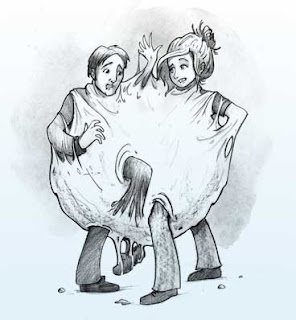So I wanted to talk about enmeshment a little. For me, enmeshment is a big reason about why I make serious hurtful mistakes. Hurtful to myself and hurtful to others. Enmeshment occurs in relationships between people who have not developed their own identities and boundaries. Each person's sense of wholeness and self-worth is intertwined with those of the other person. It is as if there were only one identity, and it is difficult for either to function fully without the other. (CODA BLUE BOOK, pg 114, what is enmeshment?)
Enmeshment is common among lovers, family members, friends, and care taking situations. An enmeshed relationship does not allow for autonomy, wholeness, or personal empowerment. We cannot focus on ourselves, our higher power, or relationships with others because our focus is overwhelmingly with someone else.
The way we step out of enmeshment is by setting and living with healthy boundaries. We have to keep the focus on ourselves and work to define who we are, what we want and need, and develop our own opinions.
For me, in past relationships, I could not see my life without the other person, and I could not bare it when they were unhappy about anything. I would move mountains and sacrifice anything to make sure that their happiness was taken care of, and that they were pleased. As I look back on it, it wasn't really that I wanted them to be happy, I just didn't want them to be angry, and most of all not angry with me. Also, I wanted them to notice that they were happier because of the things that I was doing and see my value and worth to them in their life. I wanted the security to know that they were happy enough with me to stick with me, happy enough with my value to them that they would love me and be with me.
How do I begin to set healthy boundaries? What does that even look like? and where do I begin?
First and foremost, we begin by starting in this program at getting through an understanding of the first three steps. I don't think that you have to master them, or be really good at them, I think you have to have a basic understanding and acceptance of these steps, as they are the foundation to continued recovery. What are those steps? They are.
1. I have admitted am powerless over others, and that my life has become unmanageable.
2. I came to believe that a power greater than myself could restore me to sanity
3. I made a decision to turn my will and my life over to the care of God, as I understand God.
To remain steadfast in this process, I have to remain true to these steps, and I as I see that I am doing things the old way - I must return to the three steps and repeat them with each life scenario that I face. Then, I begin to look at boundaries. These are the imaginary borders that surround each individual's spirit, energy, behaviors, thoughts and emotions. Boundaries helps ensure our personal safety, comfort and self respect. When boundaries are violated we experience various feelings of discomfort. Boundaries are used for SELF CARE, and to respect others.
Do I know where someone stops and I begin? Do I know where my responsibility ends and theirs begins? What about, what is my business and what is none of my business?
Defining my boundaries is important, and then communicating what my boundaries are to others is also important. We cannot expect people to know what our boundaries are if we do not communicate them.






















